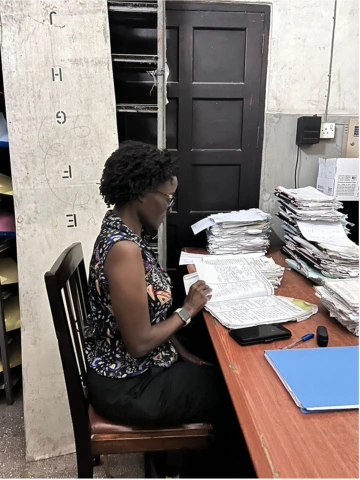Flavia Completes Data Collection for Dissertation on CAUTI Research in Kenya

Flavia has successfully completed the data collection phase of her dissertation research on catheter-associated urinary tract infections (CAUTI) in Kenya. Her study, which includes both qualitative and quantitative components, aims to advance infection prevention and control by supporting the development of active healthcare-associated infection (HAI) surveillance systems in resource-limited settings. Over the course of 3 months, Flavia conducted fieldwork primarily at the Coast General Teaching and Referral 700-bed hospital at the Kenyan Coast in Mombasa to gain a comprehensive understanding of CAUTI surveillance practices and the barriers to implementation in the local context.
Infection prevention and control has long been a global healthcare priority, with the World Health Organization identifying HAI surveillance as a core component of infection prevention and control efforts. However, in low- and middle-income countries, active HAI surveillance remains limited—mostly to intensive care units in 45 countries—with no established systems currently in place in sub-Saharan Africa. This presents a critical opportunity to improve patient outcomes, strengthen monitoring efforts, and inform better infection control strategies. Flavia’s research contributes to this goal by identifying the challenges and opportunities necessary to build a sustainable CAUTI surveillance framework.
Throughout her time in Kenya, Flavia navigated several challenges, beginning with the country’s two-tiered ethical review process. The process, which can take up to 10 weeks, requires more extensive protocol documentation than a standard U.S. doctoral proposal, making thorough preparation essential to avoid delays. Additional hurdles arose during the data collection process. Due to the timing of catheterizations, Flavia had to arrive at the hospital earlier than planned and stay late in order to observe the catheter insertion procedures. Limited access to patient records required her to recruit assistance from someone in the records department, who was only available on weekends, necessitating weekend work. The absence of electronic health records further complicated the process, as data abstraction had to be done manually from paper charts—some of which were disorganized, with loose or missing pages. Additionally, modifications to the original data collection plan were necessary; for example, the intended focus group discussion with committee members could not be convened, so Flavia opted to conduct individual interviews instead.
Within the hospital setting, practical constraints further shaped the research experience. Due to staff shortages, Flavia often stepped in to support patient care tasks such as changing urinary catheters, assisting with patient movement, and changing bedding. These experiences underscored a key lesson: in resource-limited settings, healthcare epidemiology is not a discipline that allows for observation from the sidelines. Researchers must be prepared to engage actively and respond to the realities on the ground.
With data collection now complete, the next phase of her project will focus on analysis and dissemination of findings, particularly with the goal of sharing insights that can be implemented in similar resource-constrained environments. Flavia is especially excited about the qualitative data component, which will add valuable context and narrative depth to the numerical findings, helping bridge the gap between data and real-world impact.
